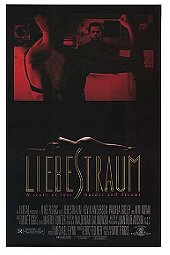Operating under the logic of dreams, with everyone delivering their dialog at a sleepy pace, Liebestraum is a series of beautiful images signifying nothing of interest. All it offers is moody and stylish surfaces, interminable verbal exchanges about architectural designs, and a central mystery that announces its obvious conclusion from the moment its dangled in front of you.
A forbidden romance in the present has echoes in the past, and these symmetrical story beats repeat throughout the film. Often times they’re ham-fisted and obvious, like Kim Novak’s death-bed scene contrasted with a couple’s mutual orgasms. It plays out as unintentional silliness, but it’s pitched for serious conviction and delivered with verve.
Shame that none of these emotionally synchronous moments are in service of a better script. Writer/director Mike Figgis seems drunk upon his images and stark light compositions, his disturbed angles and sense of impending doom. A series of coincidences pile up, revelations pour out in elliptical manners, and our hero stares blankly and introspectively for far too much of the film.
Then there’s the curious problem of Kim Novak, or rather, the curious problem of how little screen time she gets. Her character holds the answers to the various mysteries pulling these characters together, but her scenes amount to a small handful and her lines of dialog about a dozen or so. Apparently, she feuded with the director over their overall vision for the piece and her performance, and he threatened to cut her role out of the picture. So it appears he followed through on that threat, essentially killing his calf on the altar of ego. The resulting film ends up treating this mystery and character revelations as mere afterthoughts to the dual affairs, seduction through photography, and villainous building developments.
As the film goes on, Novak’s spectral appearance begins to feel like borrowed cinematic weight. As though Figgis was trying to create his own variation of an Alfred Hitchcock film, and he needed borrowed prestige from Novak’s legacy as one of his greatest cool blondes. This element of borrowed prestige haunts the film; it creates an evocative atmosphere and thinks it’s telling a masterful study of suspense and personal tragedy, but it’s laborious and lacking in substance.
 Login
Login